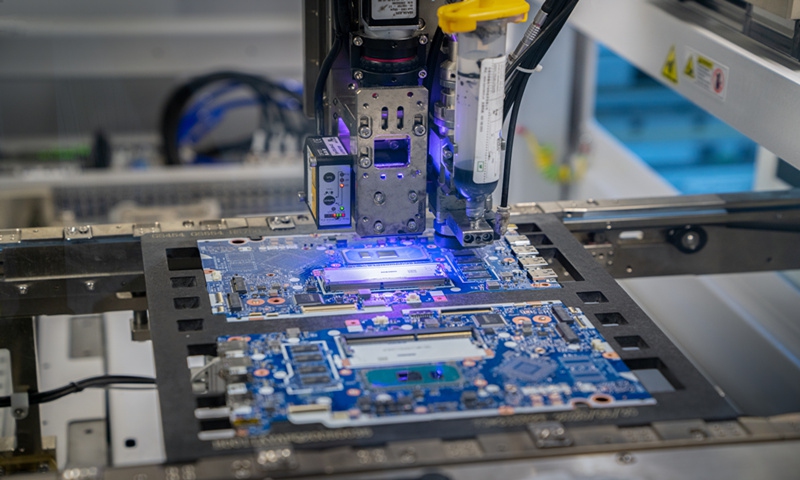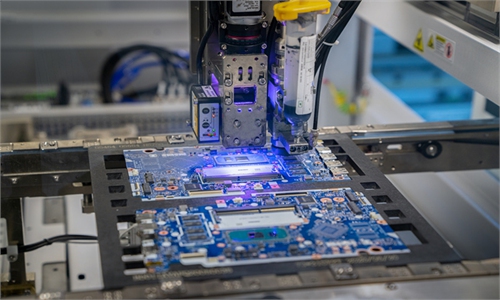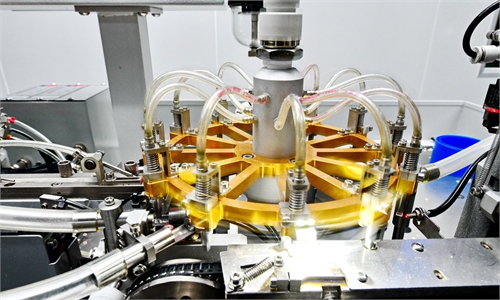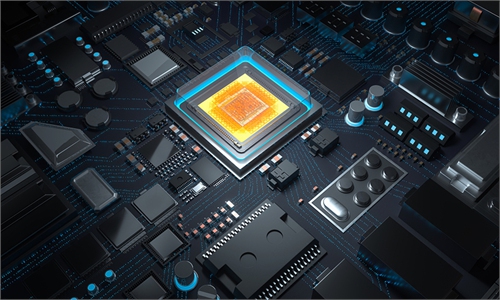
A chip manufacture machine Photo: VCG
The US government's intensifying chip sanctions against China have forced Chinese firms to search for alternatives to advanced chips used in cutting-edge artificial intelligence (AI) and could even offer a new opportunity for Chinese firms to take the lead in the emerging technology, some Chinese experts said on Monday.
Through a series of sanctions, Washington has banned the sale of certain advanced chips to Chinese firms and the US government is reportedly planning to implement further sanctions, including tightening chipmaking exports to China.
However, contrary to what the US government intends to achieve through the sanctions - reining in China's technological rise - Chinese firms are actively seeking alternatives to advanced US chips, as they rush to develop AI, according to media reports and analysts.
In an exclusive report published on Sunday, the Wall Street Journal said that Washington's sanctions are spurring Chinese technology companies to accelerate research to develop cutting-edge AI without relying on the latest US chips.
The report said that "Chinese companies are studying techniques that could allow them to achieve state-of-the-art AI performance with fewer or less powerful semiconductors. They are also researching how to combine different types of chips to avoid relying on any one type of hardware." Specifically, the report mentioned Huawei, Baidu and Alibaba as being among the Chinese companies undertaking such an endeavor.
Citing researchers and analysts, the Wall Street Journal report suggested that while "using these workarounds to catch up with American AI leaders remains a significant challenge... some experiments have shown promise, however, and if advanced successfully, the research could allow Chinese tech firms to both weather American sanctions and make them more resilient to future restrictions."
According to Guo Tao, a veteran industry analyst, in the field of AI chips, the US ban on the sales of advanced chips could mean that chip giants will lose China, the world's largest semiconductor market.
"In the long run, Chinese AI chip manufacturers are expected to usher in new opportunities for changing lanes and overtaking [their competitors]," Guo told the Global Times on Monday.
Hong Yong, an expert at the digital real economies integration Forum 50, said that while Washington's chip bans created difficulties for Chinese companies' development in the AI sector, they will not undermine Chinese companies' competitiveness.
"Chinese enterprises have the ability to meet these challenges through technological innovation and talent accumulation, and maintain their competitiveness and development momentum," Hong told the Global Times on Monday, noting that China already has many important achievements and excellent talent in the field of AI, which are important foundations for the development of China's AI industry.
Chinese enterprises can reduce their dependence on computing power and improve algorithm efficiency and accuracy by optimizing algorithms. They can also share computing resources and model parameters through multi-party participation in collaborative learning, so as to realize the distributed training of models and improve algorithm efficiency and model performance, according to Hong.
Global Times



